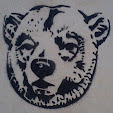Another new name encountered at the Toy Fair in Kensington back in January was Popup Games, a clever use of paper folding to produce games which can be taken with the players, mid-action, and carried on with at the other end [of the journey] by the simple expedient of opening the game up again, and finding the previous state of play popping-up, as it was left!
Ludus latrunculorum, latrunculi, or simply latrones ("the game of brigands", or "the game of soldiers" from latrunculus, diminutive of latro, mercenary or highwayman) was a two-player strategy board game played throughout the Roman Empire. It is said to resemble chess or draughts, as it is generally accepted to be a game of military tactics. Because of the scarcity of sources, reconstruction of the game's rules and basic structure is difficult, and therefore there are multiple interpretations of the available evidence.
- Wikipedia
Five Lines (Greek: πέντε γραμμαί, Romanized: pente grammai) is the modern name of an ancient Greek tables game. Two players each move five counters on a board with five lines, with moves likely determined by the roll of a die. The winner may have been the first one to place their pieces on the central "sacred line". No complete description of the game exists, but there have been several scholarly reconstructions, including Schädler's and Kidd's.
- Wikipedia
Tafl games, also known as Hnefatafl games, are a family of ancient Northern European strategy board games played on a chequered or latticed game board with two armies of uneven numbers.
- Wikipedia
As you can see from the Wiki' quotes, there is a pattern here, as well as being fold-away games, they are specialising in games which, while maybe not familiar to the man in the street, have been known to mankind for centuries, or millennia! I didn't see the Game of Ur, but it may only be a matter of time?
A more traditional game, instead of the playing pieces (which you will note were all figural), slotting down into a box-like structure, with the chess set, players get pieces with three-dimensional box-bases, where, provided one player keeps the boxes toward him and the other away, all will fold neatly, and tightly into the playing surface, at any point the game needs pausing.
Quite apart from the idea of folding games, and the plethora of ancient games re-imagined, there is also the ecological aspect of a 100% paper/card product, so I hope Popup Games do very well, and a couple of them rather reminded me of all those inter-war/post-war games like Tri-Tacktics and Dover Patrol.
Some pop-up retailers took the Popup URL a year earlier, so they can be found under the owners name, here;








No comments:
Post a Comment